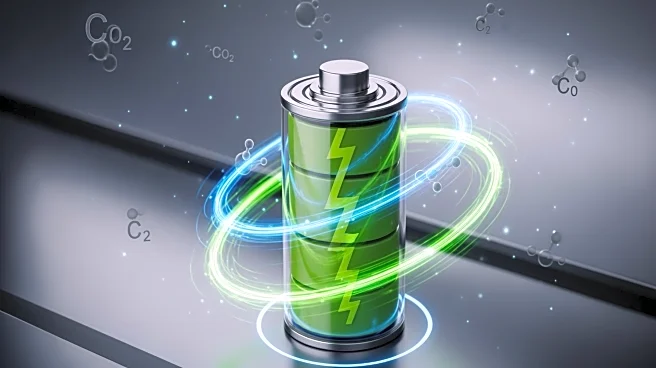What's Happening?
Anaphite, a UK-based startup, has developed a dry electrode coating process that significantly reduces the carbon footprint associated with battery production. Traditional wet coating methods, which are prevalent in 99% of current battery manufacturing,
require large, energy-intensive ovens to dry the electrode material. Anaphite's innovative dry coating process eliminates the need for these ovens, thereby reducing energy consumption and emissions. According to an independent analysis by Minviro, a lifecycle consultancy, this technology can cut CO2 emissions by 3.57kg per kWh of cell capacity. If implemented globally, it could save approximately seven million tonnes of CO2 annually. The feasibility study, funded by a UK government grant under the Automotive Transformation Fund, confirms the environmental benefits of Anaphite's technology, aligning with upcoming EU battery regulations.
Why It's Important?
The development of Anaphite's dry coating technology is significant for the battery manufacturing industry, particularly in the context of electric vehicles (EVs). As the demand for EVs grows, so does the need for more sustainable battery production methods. Anaphite's process not only reduces the carbon footprint but also offers cost savings by freeing up factory space and reducing energy use. This innovation supports global efforts to combat climate change by lowering industrial emissions. Additionally, the alignment with EU regulations ensures that Anaphite's technology is well-positioned for future compliance, potentially giving it a competitive edge in the market. Manufacturers stand to benefit from reduced operational costs and improved sustainability credentials, which are increasingly important to consumers and regulators alike.
What's Next?
Anaphite's dry coating technology is poised to influence the future of battery manufacturing, particularly as the EU prepares to implement new regulations requiring a Battery Passport for all industrial batteries over 2kWh by 2027. This regulation will necessitate detailed carbon footprint reporting, for which Anaphite's technology is already compliant. As the industry moves towards more sustainable practices, other manufacturers may adopt similar technologies to remain competitive. The success of Anaphite's process could also encourage further innovation in battery production, potentially leading to new breakthroughs in energy storage and efficiency. Stakeholders, including policymakers and environmental groups, will likely monitor the adoption and impact of such technologies closely.
Beyond the Headlines
The shift towards dry coating technology in battery production highlights broader trends in industrial sustainability and innovation. As companies seek to reduce their environmental impact, there is a growing emphasis on lifecycle assessments and compliance with international standards. Anaphite's collaboration with Minviro exemplifies the importance of transparent, rigorous environmental assessments in validating new technologies. This development also underscores the role of government funding and support in advancing green technologies, as seen with the UK government's Automotive Transformation Fund. The success of such initiatives could inspire similar efforts in other sectors, promoting a more sustainable industrial landscape.
















